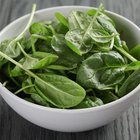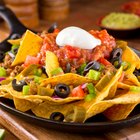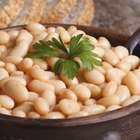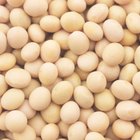
If your toddler's tummy is hurting but he's not vomiting or suffering from diarrhea, gas is the most likely culprit. Kids get gassy after eating certain foods -- and sometimes after eating too fast. If your toddler is prone to gas, minimize gas-causing foods in his diet and teach him to practice good eating habits.
High-Carbohydrate Culprits
Foods with a high-carbohydrate content release gas in your toddler's digestive system. Ideally, that gas gets expelled through belching or flatulence -- often to your toddler's great amusement. But when there's too much gas to move through his system quickly, it can build up, causing bloating and abdominal pain. Foods like broccoli, cauliflower, lettuce, cabbage, baked beans, apples, pears and Brussels sprouts are the most common culprits, according to MayoClinic.com.
Extra Air Boosters
Some foods can cause gas because they make your child swallow air. If your toddler is sucking on sugary candies or chewing gum, he'll swallow more frequently, which can cause air to build up in his digestive system. Along the same lines, carbonated beverages release carbon dioxide gas; when your toddler drinks them, some of that gas goes right into the stomach, causing bloating and discomfort.
The Allergy Connection
Sometimes, the problem is that your toddler has an allergy or intolerance to the food he's eating. Dairy products are one of the most common allergy-related causes of gas: Kids whose bodies don't produce enough of the enzyme that digests dairy products end up with gas produced by partially digested lactose. If you notice your child's gas is worse after eating or drinking dairy products, ask your doctor to run an allergy test. Although lactose is the most common culprit, other food allergies can cause gas, too. If gas is a serious problem for your toddler, track his diet to see whether a particular food is a trigger.
Minimize the Risk
In a perfect world, you would never feed your toddler anything that causes him to have gas. In reality, a little gas is probably inevitable. Sometimes you have to make do with a less-than-tummy-soothing meal on a hectic night or find out too late that a particular food is a gas trigger for your child. To minimize the risk, teach your child to eat slowly, chew thoroughly and drink without gulping to reduce the likelihood of developing gas, whatever he is eating.
Related Articles
Foods to Give a Toddler to Help With ...

How to Cheer a Guy Up

Dating With a Toddler

How to Make My 5-Year-Old Calm Down

Why Do My Upper Lips Get Chapped With ...
Tips to Help Relieve Sinus Pressure ...

Does Fresh Spinach Cause Bloating?

What Can I Do if My Girlfriend Is ...

The Effects of Inhaling Air Dusters

Symptoms of Adult Survivors of Child ...

The Best Fiber Supplements for Men

What Happens If You Eat Spoiled Lunch ...

How Can I Rid My Body of Water ...

What Is Something Fun & Spontaneous I ...

Food to Make Your Bowels Move

How to Tell Him He Is a Good Father

How to Eliminate Gas When Cooking White ...
What to Do for Your Husband’s Birthday

Can You Cook a Frozen Hotdog?

Warning Signs When Dating a Divorced ...
References
Writer Bio
Holly Roberts is an award-winning health and fitness writer whose work has appeared in health, lifestyle and fitness magazines. Roberts has also worked as an editor for health association publications and medical journals. She has been a professional writer for more than 10 years and holds a B.A. in English and an M.A. in literature.
Photo Credits
BananaStock/BananaStock/Getty Images